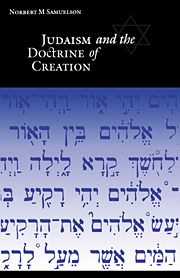PART 1 - THE MODERN DOGMA OF CREATION
Published online by Cambridge University Press: 08 January 2010
Summary
This book is a study of the doctrine of creation as it arose out of the texts of rabbinic Judaism with particular emphasis on those writings that are explicitly philosophical. I will begin with what in my judgment is the best contemporary statement of the dogma, that of Franz Rosenzweig in The Star of Redemption, and then work my way back through his sources in classical rabbinic commentaries on the first chapter of Genesis in the Hebrew scriptures. Of all of the material to be discussed in this book, Rosenzweig's text is the most difficult. Beyond the inherent complexity of the concepts themselves, his work is especially difficult for two reasons:
First, his language and style make his text simply difficult to understand in its own right. Rosenzweig wrote for an audience educated in Germany at the beginning of the twentieth century that was schooled in the philosophic tradition of people like Schelling and Hegel. Furthermore, he believed that good philosophy ought to be literate in the sense that its words should speak simultaneously at many levels. Furthermore, the sentences that express good philosophy should be rich in the sense that they contain allusions to the best that civilization has produced in every form of literature. All of this today functions as a barrier to readers (particularly those raised in an English language tradition) comprehending what Rosenzweig wants to communicate. Part of the problem is that most of us grow up in a tradition of philosophy modeled on empirical science, where non-literate and shallow language (generally appealed to under the slogan of “clarity and precision”) are more valued.
- Type
- Chapter
- Information
- Judaism and the Doctrine of Creation , pp. 23 - 28Publisher: Cambridge University PressPrint publication year: 1994



